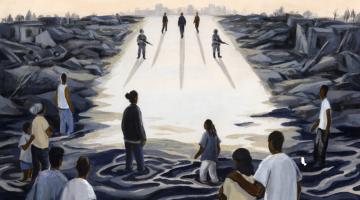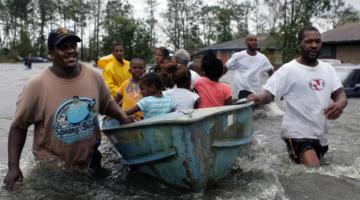“Code speaking” in the presence of Power can be strategic, but it is also fraught with perils for Black folk.
“It’s important for us to create our own tables where we can say whatever we want.”
In this series, we ask acclaimed authors to answer five questions about their book. This week’s featured author is Ralina L. Joseph. Joseph is Associate Professor of Communication at the University of Washington, Seattle. Her book is Postracial Resistance: Black Women, Media, and the Uses of Strategic Ambiguity.
Roberto Sirvent: How can your book help BAR readers understand the current political and social climate?
Ralina Joseph: What my book helps BAR readers understand is how we ended up in the mess we’re in now! Or rather, it exemplifies what happens when we don’t all shine a light on the coded racism that functions through ideologies of postrace. I contend that 45 was elected partially because liberals (particularly some White liberals unused to reading racial nuance) were so besotted by the Obama-era myth of postracialism, that they didn’t get “in formation” (to quote Beyoncé) until it was too late. What my book helps illustrate is that racism isn’t always bald, bold, or blatant. It’s also subtle and insidious in its very subtlety. In order to fight racism on all of its devious fronts we need to be able to have tools to fight what Stuart Hall referred to as both the overt racism, and racism of the inferential variety. I’m hoping that my book helps out with the latter.
What do you hope activists and community organizers will take away from reading your book?
I hope that folks will take away the notion that we all must have multiple tools in our toolboxes to fight racism. If we want to be able to “sit at the table,” one of the primary metaphors I pick up in the book, we have to understand that sitting at their table comes with our appearing to follow their rules…at least until we become the folks at the head of the table. This subterfuge is at the heart of the notion of strategic ambiguity – the idea that we must sometimes speak in code (instead of speaking forthrightly) in order to be invited to speak at the table, and to be allowed to remain at the table. This is an important strategy at certain moments so that we can join the tables where the most important decisions are made, but it’s also important for us to create our own tables…where we can say whatever we want(however we want to), invite whomever we want, and discuss whatever topics we want.
We know readers will learn a lot from your book, but what do you hope readers will un-learn? In other words, is there a particular ideology you’re hoping to dismantle?
I am hoping that readers will come away from the book with the understanding that Black women – like all minoritized people – should not be judged for picking up different tools at different moments. To be more clear: I hope that we don’t judge, shame or blame each other over one choice being more “woke” or less “sell-out” than another choice. Joining the table and biting your tongue might be part of the long game you need to play in order to create your own table eventually. What I hope is that instead of judging each other for the ways in which we resist racialized sexism, that we judge, shame, and blame the structures at play – racism and sexism.
Who are the intellectual heroes that inspire your work?
So many people! First and foremost, I think I cite Stuart Hall in everything I write. Jane Rhodes and Daphne Brooks have been my mentors since graduate school and their work is always an inspiration. I think I cite Jane in my preface and Daphne in my coda. Herman Gray’s formulations of Blackness and media are always foundational for me. In addition, so many Communication race and media scholars writing today have shaped my work from established scholars such as Robin Means Coleman, Isabel Molina-Guzman, Angharad Valdivia, Beretta Smith-Shomade, Bambi Haggins, LeiLani Nishime, Kristen Warner, and Mary Beltran, to up-and-coming scholars such as Manoucheka Celeste, Madhavi Murty, Jennifer McClearen, Anjali Vats, Myra Washington, Dayna Chatman, Timeka Tounsel, Bryce Henson, Jilian Baez, and Racquel Gates. And so many more I know I’m forgetting to list here! I am also daily inspired by my current Ph.D. advisees – Victoria Thomas, Marcus Johnson, Mia Lawrie, Meshell Sturgis and Teddy McGlynn-Wright.
In what way does your book help us imagine new worlds?
While the book seeks to be part of the collective project of building a new world, it primarily serves to uncover the layers of this current world that often function without recognition, for we can only usher in that imagined new world after understanding and grappling with the complexitites of the current one. I hope that my book helps readers imagine the ways in which resistance happens in all kinds of ways that might not – at least immediately - always look like resistance. On the flip side, I hope it also helps us think about the perils of what happens when responding through code, or relying too heavily on strategic ambiguity, becomes your default. If you’re choosing not to speak back to racialized sexism, it should be an active choice with some sort of resistant action planned…not just silence as the end result. I hope it also helps us think about the beauty of the utopic new world that we create when we are able to fully abandon strategic ambiguity and resist without the codes of postrace.
Roberto Sirvent is Professor of Political and Social Ethics at Hope International University in Fullerton, CA. He also serves as the Outreach and Mentoring Coordinator for the Political Theology Network. He is co-author, with fellow BAR contributor Danny Haiphong, of the new book, American Exceptionalism and American Innocence: A People’s History of Fake News—From the Revolutionary War to the War on Terror.
COMMENTS?
Please join the conversation on Black Agenda Report's Facebook page at http://facebook.com/blackagendareport
Or, you can comment by emailing us at comments@blackagendareport.com



















